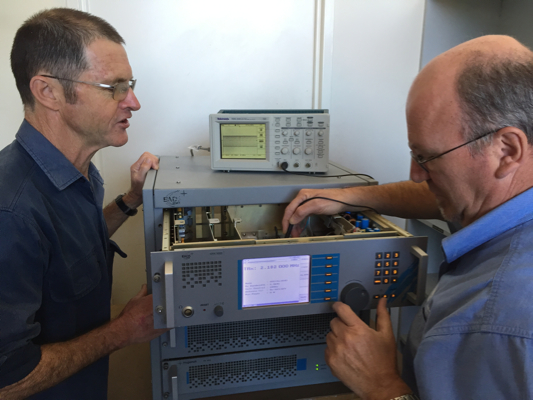When Electrotech CEO Stephen Renkert started the maritime navigation and communications specialist company in 1990 in Sydney, he was seeking opportunity in a changing marketplace.
Philip Smart | Adelaide
The market in Australia had been dominated by AWA for many years. Indeed, AWA was a descendant of the Marconi company that supplied the Titanic’s communications equipment and trained operators. The Titanic’s radio operators, one of whom survived the sinking, wore Marconi uniforms rather than those of the White Star Line.
 Electrotech has service personnel in half a dozen major Australian ports to minimise the time needed to repair critical communications and navigation systems, and maximise a ship's chances of putting to sea on time. Credit: Electrotech
Electrotech has service personnel in half a dozen major Australian ports to minimise the time needed to repair critical communications and navigation systems, and maximise a ship's chances of putting to sea on time. Credit: Electrotech
Under the Marconi system the company leased its communications systems and trained radio operators to shipping companies, with operators sometimes assigned to particular ships for just a single voyage and answering to no one but the ship’s master.
AWA had come to dominate provision of this service and also supply of communications and navigation systems for Australian shipping.
“AWA had dominated the bridge of ships of Australian flag and the Australian flag was a lot more popular in those days,” Renkert said. “AWA would often own the radio station and the navigation equipment on board and lease it to the shipping company.”
With technology changing at an ever-growing pace, and after some recent experience in other areas of the maritime business, Stephen Renkert identified a business opportunity.
“I was talking to shipping companies and found that there was an opportunity for another player in the market. And I ended up employing several marine electronics project managers and technicians and we decided to stick our oar in the water and see if we could put something together.”
The company’s first Navy related success was supplying and fitting a Decca navigation radar for HMAS Tobruk at short notice, allowing the ship to keep its sailing schedule.
Success bred success, with radar retrofits on Fremantle Class patrol vessels, then supply and commissioning of integrated navigation and communications equipment on various patrol boats and passenger ferries built in the Austal shipyard, including the eight Australian Customs Service Bay Class vessels, the 14 Royal Australian Navy Armidale patrol vessels, six patrol vessels for Trinidad and Tobago and more recently the eight Cape Class Border Protection Service patrol boats replacing the Cape Class.
Electrotech can supply complete navigation and safety communications suites including: Northrop Grumman Sperry Marine Radars, ECDIS, Gyro / Steering Systems; Cobham Sailor GMDSS Safety and Satellite Communications; Cobham Seatel Satellite TV; Danelec Voyage Data Recorders; Saab DGNSS and AIS; Francis Searchlights; Jotron EPIRBs and SARTs and Zenitel Internal Communications and more.
"Communications equipment that filled two rooms on Titanic has given way to more capable equipment that can fit on a desktop."
Electrotech has now supplied and installed communications and navigation equipment for more than 60 Navy projects, including ongoing support for the ring laser gyro system on the Anzac frigates and radars, gyros and data distribution systems for the new Landing Helicopter Dock (LHD) vessels.
Times and technologies have changed. The dedicated radio operators of old are gone, replaced by personnel for whom communications is just one task among several. Communications equipment that filled two rooms on Titanic has given way to more capable equipment that can fit on a desktop. And even at sea, the long arm of big data has made an impact. Most equipment on board ship now not only talks to other systems on the vessel, but also other systems ashore.
“You know, 20 years ago or probably less than that, it would have been difficult to comprehend software being needed for a gyro to work,” Renkert said. “It was a mechanical thing. So was the radar. So was a radio. Now they are all sophisticated digital sensors on a network. And the capability this provides is fantastic unless something goes wrong with the network, or somebody plays with settings who’s not trained.
“Often a corollary of that is that the average technician has to be IT savvy. The days of repairing equipment with a soldering iron and electronic components are disappearing.
“Plus so much data is required ashore now. All big shipping companies need to be monitoring every aspect of the ship’s performance while it’s underway. That’s a huge amount of air time that’s needed to constantly transmit all this data to shore and back to the vessel that they’re monitoring while they’re underway.
“Additionally, crews are kept in contact with the rest of the world like never before, where they can remain in contact with family and friends from the middle of an ocean, as well as watching normal TV programs.”
Renkert believes Electrotech has built a business on the ability to deliver quickly and reliably in locations around Australia. The company has facilities in Melbourne, Perth, Brisbane, Gladstone, Cairns, Darwin, Karratha and Sydney. And continuity of personnel (some of Electrotech’s employees who joined straight from high school are now in their 40s) has provided many knowledge sharing benefits over the longer term. The philosophy is that servicing well leads to long term relationships.
“The business principle really was to provide service,” Renkert said. “And the concept of this company always has been that service leads to sales. It doesn’t go the other way. And that has been very productive.”
Renkert originally came to the maritime business after holding management positions in large companies such as CSR and Tubemakers. But with 25 years in maritime, he’s not looking back.
“I’ve fallen in love with the industry. I’ve been at it a long time and it’s become a passion. I like physical things. And it’s a physical business. It’s quite competitive in some ways too, so it has the spirit of the chase.”



